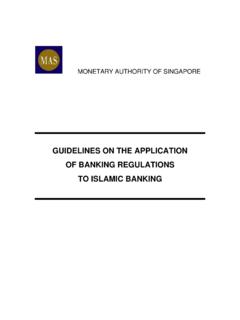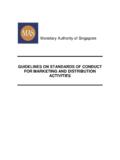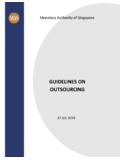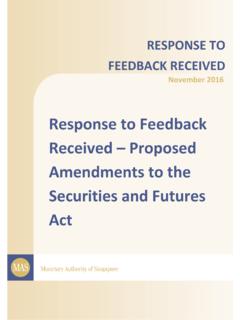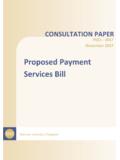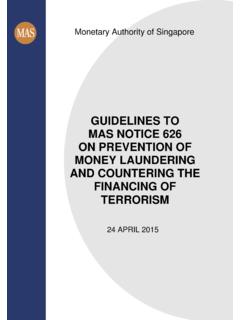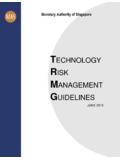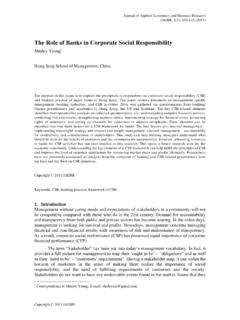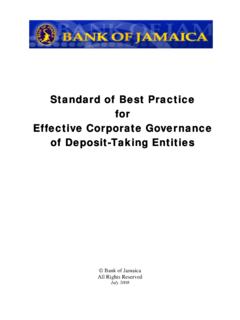Transcription of THE MONETARY AUTHORITY OF SINGAPORE
1 1 THE MONETARY AUTHORITY OF SINGAPORE Issue date: 3 April 2013 GUIDELINES ON corporate GOVERNANCE FOR FINANCIAL HOLDING COMPANIES, BANKS, DIRECT INSURERS, REINSURERS AND CAPTIVE INSURERS WHICH ARE INCORPORATED IN SINGAPORE 1 The Guidelines on corporate Governance ( The Guidelines ) are relevant to all financial holding companies, banks, direct insurers, reinsurers and captive insurers ( the insurers ), which are incorporated in SINGAPORE (collectively the Financial Institutions ). They provide guidance on best practices that Financial Institutions should strive to achieve in relation to their corporate governance. 2 The Guidelines should be read in conjunction with the provisions of the Banking Act (Cap.)
2 19) or the Insurance Act (Cap. 142) as the case may be, the relevant corporate Governance Regulations issued pursuant to either of the Acts as well as written directions, codes and other guidelines that the MONETARY AUTHORITY of SINGAPORE ( the AUTHORITY ) may issue from time to time. 3 The Guidelines at Annex 1 comprise the Code of corporate Governance 20121a ( Code ) for companies listed on the SINGAPORE Exchange and supplementary principles and guidelines added by the AUTHORITY (in italics) to take into account the unique characteristics of the business of banking and insurance, given the diverse and complex risks undertaken by these Financial Institutions and their responsibilities to depositors and policyholders.
3 4 The AUTHORITY expects every Financial Institution to observe the Guidelines at Annex 1 to the fullest extent possible. Financial Institutions listed on the SINGAPORE Exchange should disclose their corporate governance practices and explain deviations from the Guidelines in their Annual Reports. Financial Institutions that are not listed on the SINGAPORE Exchange should disclose the same on their websites. For ease of 1a The Code was last revised on 2 May 2012 and can be found at ~/media/resource/fin_development/corpora te_ 2 reference, the specific principles and guidelines in the Code for disclosure are set out in Annex 2.
4 Rationale for a corporate Governance Framework for Financial Institutions 5 In an increasingly complex business environment influenced by globalisation and other rapid changes in the financial sector, good corporate governance is crucial to ensure that the business of a Financial Institution is managed in a safe and sound manner. Weak governance can undermine public confidence in that particular Financial Institution as well as the financial system and markets in which it operates. 6 In SINGAPORE , directors of a company are required to promote the success of the company in the interests of its shareholders as a group. corporate governance for Financial Institutions is of greater importance given their crucial financial intermediation roles in an economy and the need to safeguard depositors and policyholders funds.
5 Risk-based Supervision and corporate Governance 7 The AUTHORITY recognises that the Board plays a critical role in the successful operation of a Financial Institution. The Board is chiefly responsible for setting corporate strategy, reviewing managerial performance and maximising returns for shareholders at an acceptable level of risk, while preventing conflicts of interest and balancing competing demands on the Financial Institution. Therefore, the effectiveness of the Board of a Financial Institution is a basic tenet of the AUTHORITY s risk-based supervisory approach. While the Board may delegate to Management the responsibility for formulating sound and prudent policies and practices, it remains accountable and cannot abrogate its overall responsibility for the Financial Institution.
6 This does not mean however that the Board should assume the role of the Management. Management is accountable to the Board for the day-to-day conduct of the business and affairs of the Financial Institution. Cancellation of Guidelines 8 These Guidelines take immediate effect. The Guidelines on corporate Governance for banks, financial holding companies and direct insurers which are incorporated in SINGAPORE , issued on 9 December 2010, are cancelled. 3 ANNEX 1 BOARD MATTERS THE BOARD'S CONDUCT OF AFFAIRS Principle: 1 Every company should be headed by an effective Board to lead and control the company. The Board is collectively responsible for the long-term success of the company.
7 The Board works with Management to achieve this objective and Management remains accountable to the Board. Guidelines: The Board's role is to: (a) provide entrepreneurial leadership, set strategic objectives, and ensure that the necessary financial and human resources are in place for the company to meet its objectives; (b) establish a framework of prudent and effective controls which enables risks to be assessed and managed, including safeguarding of shareholders' interests and the company's assets; (c) review management performance; (d) identify the key stakeholder groups and recognise that their perceptions affect the company's reputation.
8 (e) set the company's values and standards (including ethical standards), and ensure that obligations to shareholders and other stakeholders are understood and met; and (f) consider sustainability issues, environmental and social factors, as part of its strategic formulation. All directors must objectively discharge their duties and responsibilities at all times as fiduciaries in the interests of the company. 4 The Board may delegate the AUTHORITY to make decisions to any board committee but without abdicating its responsibility. Any such delegation should be disclosed. The Board should meet regularly and as warranted by particular circumstances, as deemed appropriate by the board members.
9 Companies are encouraged to amend their Articles of Association (or other constitutive documents) to provide for telephonic and video-conference meetings. The number of meetings of the Board and board committees held in the year, as well as the attendance of every board member at these meetings, should be disclosed in the company's Annual Report. Every company should prepare a document with guidelines setting forth: (a) the matters reserved for the Board's decision; and (b) clear directions to Management on matters that must be approved by the Board. The types of material transactions that require board approval under such guidelines should be disclosed in the company's Annual Report.
10 Incoming directors should receive comprehensive and tailored induction on joining the Board. This should include his duties as a director and how to discharge those duties, and an orientation program to ensure that they are familiar with the company's business and governance practices. The company should provide training for first-time directors1 in areas such as accounting, legal and industry-specific knowledge as appropriate. It is equally important that all directors should receive regular training, particularly on relevant new laws, regulations and changing commercial risks, from time to time. The company should be responsible for arranging and funding the training of directors.
